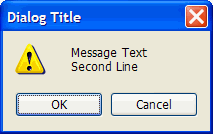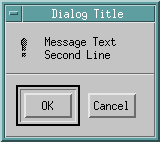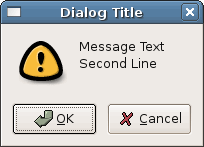IupMessageDlg
Creates the Message Dialog element. It is a predefined dialog for displaying a message. The dialog can be shown with the IupPopup function only.
Creation
Ihandle* IupMessageDlg(void); [in C] iup.messagedlg() -> (elem: ihandle) [in Lua] messagedlg() [in LED]
Returns the identifier of the created dialog, or NULL if an error occurs.
Attributes
TITLE: Dialog title.
VALUE: Message text.
DIALOGTYPE: Type of dialog defines which icon will be displayed besides the message text.
Can have values: "MESSAGE" (No Icon), "ERROR" (Stop-sign), "WARNING" (Exclamation-point), "QUESTION" (Question-mark) or "INFORMATION" (Letter "i"). Default: "MESSAGE".
BUTTONS: Buttons configuration.
Can have values: "OK", "OKCANCEL" or "YESNO". Default: "OK".
Addicionally the "Help" button is diplayed if the HELP_CB callback is defined.
BUTTONDEFAULT: Number of the default button. Can be "1" or "2". "2" is valid only for "OKCANCEL" and "YESNO" button configurations.
BUTTONRESPONSE: Number of the pressed button. Can be "1" or "2".
PARENTDIALOG: (Creation Only) Name of a dialog to be used as parent. This dialog will be always in front of the parent dialog.
Callbacks
HELP_CB: Action generated when the Help button is pressed.
Notes
The IupMessageDlg is a native pre-defined dialog not altered by IupSetLanguage.
To show the dialog, use function IupPopup. In Lua, use the popup function.
The IupMessage function simply creates and popup a IupMessageDlg.
In Windows each different dialog type is associated with a different beep sound.
Examples
Ihandle* dlg = IupMessageDlg();
IupSetAttribute(dlg, "DIALOGTYPE", "WARNING");
IupSetAttribute(dlg, "TITLE", "Dialog Title");
IupSetAttribute(dlg, "BUTTONS", "OKCANCEL");
IupSetAttribute(dlg, "VALUE", "Message Text\nSecond Line");
IupPopup(dlg, IUP_CENTER, IUP_CENTER);
printf("BUTTONRESPONSE(%s)\n", IupGetAttribute(dlg, "BUTTONRESPONSE"));
IupDestroy(dlg);
| Windows XP | Motif/Mwm | GTK/GNOME |
|---|---|---|
 |
 |
 |
See Also
IupMessage, IupScanf, IupListDialog, IupAlarm, IupGetFile, IupPopup